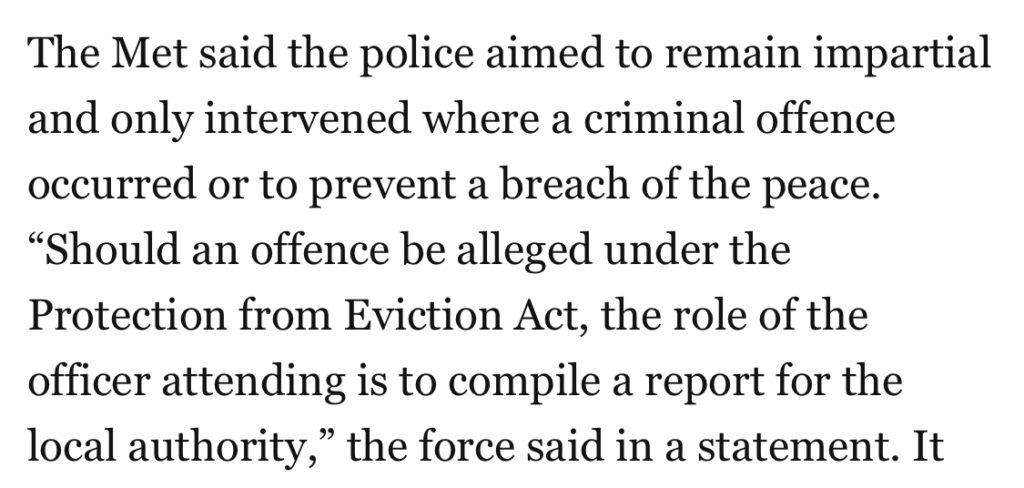Some quick notes.
First, the Homes (Fitness for Human Habitation) Bill finally has a Commons committee date! This is the next step after second reading. The committee is on 20 June 2018 and we have high hopes of getting the Bill and amendments through in one sitting (please…). And here are the amendments proposed by Karen Buck MP, dealing with common parts, clarity on periodic tenancies, amending the Bill title and avoiding Wales (who have to keep the old section 8 to 10 Landlord and Tenant Act 1985, even though they will be getting rid of it as soon as Renting Homes (Wales) Act and regulations come into force there).
Next, a Local Government Ombudsman decision concerning Manchester City Council’s reaction to an unlawful eviction. The full details are here, but basically, in deciding whether it could bring a prosecution in this particular case, MCC’s officers decided that section 3A(3)(a) to (c) of Protection from Eviction Act 1977 should be read as a list of alternatives, rather than a cumulative set of requirements, in order to establish whether some was an excluded occupier for the purposes of the PEA. The relevant section reads
(3) A tenancy or licence is also excluded if –
(a) under its terms the occupier shares any accommodation with a member of the family of the landlord or licensor;
(b) immediately before the tenancy or licence was granted and also at the time it comes to an end, the member of the family of the landlord or licensor occupied as his only or principal home premises of which the whole or part of the shared accommodation formed part; and
(c) immediately before the tenancy or licence was granted and also at the time it comes to an end, the landlord or licensor occupied as his only or principal home premises in the same building as the shared accommodation and that building is not a purpose-built block of flats.
In this instance, the landlord’s son was living in the property. MCC said this fell under 3A(3)(a) and that was that.
As the Ombudsman decision puts it:
- I disagree with the Council’s interpretation. Subsection (a) of s3A(3) of the Act is followed by a semicolon before subsection 3(b) begins. The semicolon is not followed by an ‘or’ which would be usual in cases where it is not mandatory to satisfy both conditions 3(a) and 3(b). Subsection 3A(3)(b) is then followed by an ‘and’ which confirms, in my view, that all three conditions must be met for the tenancy to be excluded. This kind of construction is entirely common in the drafting of legislation.
- The leading practitioner text (The Encyclopaedia of Housing Law and Practice) provides the following summary: “The occupier has the use in common with a member of the landlord’s family of any accommodation, and (a) immediately before the grant of the tenancy or licence, and (b) when it comes to an end, the member of the landlord’s family occupied as his only or principal home premises of which the whole or part of the shared accommodation formed part, and (c) the landlord occupies as his only or principal home other premises in the same building, not including a building which is a purpose-built block of flats”
- For the reasons set out above I consider the Council misdirected itself, and as a result failed to properly consider its discretion to exercise its powers prosecute Mr B’s landlord under s6 of the Act. That failing was fault. In addition there was some delay by the Council in reaching its decision, although Mr B’s own actions also contributed to the overall delay.
However, as the council had a discretion, not an obligation, to prosecute, it could not be said that the difference in outcome was clear. Mr B was awarded £350.
While on unlawful eviction, I had a rather heated day on twitter earlier this week, after pointing out (yet again) just how rubbish the police tend to be at unlawful evictions (and in this instance, how rubbish the Metropolitan Police’s stated policy was).
The contradiction here where an offence under the PEA is a criminal offence is obvious. This is the ‘it’s a civil matter’ approach institutionalised. The Met never got back to me on having a discussion with the officers responsible for this policy.
Hi @metpoliceuk I’m a specialist housing lawyer in London. Could you put me in touch with the officer(s) in charge of this policy? We have a lot to talk about. Not least that a policy of ‘remaining impartial’ in the face of prima facie offence might be a bit unlawful. pic.twitter.com/h6UXaAZcip
— Nearly Legal (@nearlylegal) June 9, 2018
There were some productive discussions, and some rather less so. However, what did come to light was this brief, clear and accurate guidance to the police on unlawful eviction by East Riding Council tenancy relations. Bravo to them, and ideally this should form the basis of all police training in England and Wales!

0 Comments
Trackbacks/Pingbacks